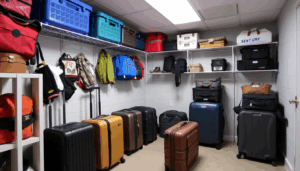For hotels, managing lost and found items is an often-overlooked but crucial aspect of operations. Whether it’s a mobile phone left behind in a room or a passport misplaced in the hotel lobby, how a hotel handles lost items can directly impact guest satisfaction, operational efficiency, and even its reputation. A well-structured lost and found policy not only keeps hotel operations running smoothly but also enhances the guest experience, leading to improved customer retention and loyalty.
This article will dive into the essential components of an effective lost and found policy, highlighting the importance of clear processes and how they lead to greater operational efficiency. We will also introduce Deliverback, a seamless solution that simplifies the process of reuniting guests with their lost belongings, enhancing the hotel’s overall service offering.
The Importance of an Efficient Lost and Found Policy
In an industry where service excellence is a top priority, every guest interaction is an opportunity to build lasting loyalty. When a guest leaves an item behind, how a hotel manages that situation can make or break the guest’s experience. A transparent and efficient lost and found policy reflects a hotel’s commitment to service, instilling confidence in guests that their concerns are taken seriously.
Moreover, a poorly managed lost and found system can cause logistical challenges and operational inefficiencies. Staff may waste valuable time searching for lost items, and without a clear procedure, valuable goods might be misplaced, leading to disputes or even potential liability issues.
By establishing a well-thought-out lost and found policy, hotels can streamline operations, minimize risks, and create a better experience for both guests and staff.
Key Elements of an Effective Lost and Found Policy
1. Detailed Documentation Process
The cornerstone of a successful lost and found policy is proper documentation. Hotels should implement a standardized system for recording lost items, including a detailed description of the item, where it was found, and when it was logged. This level of detail not only helps staff track down lost items more easily but also provides a reference if guests inquire about their belongings after leaving the hotel.
Once an item is documented, it should be logged into a centralized system, accessible to relevant staff members. Whether the hotel uses a traditional logbook or a digital inventory system, proper documentation ensures that no item falls through the cracks.
Essential Documentation Steps:
- Item description, including color, brand, and distinguishing features.
- Location and time of discovery.
- Contact information of the guest, if available.
- Any communications with the guest regarding the lost item.
- Photos of valuable or identifiable items.
By documenting lost items thoroughly, the hotel ensures accountability and clarity when resolving lost item claims, which significantly improves guest satisfaction.
2. Clear Procedures for Handling and Storage
It’s not enough to just record lost items—how they are handled and stored also matters. A designated storage area should be used to keep lost items secure and organized. High-value or sensitive items such as passports, electronics, or jewelry should be stored separately in a safe, and access should be limited to authorized personnel only.
For general lost items, hotels should establish a set timeframe during which items will be held before they are discarded, donated, or turned over to local authorities. Clearly communicating this timeframe to guests reduces confusion and ensures realistic expectations.
Moreover, hotel staff should be trained on how to handle lost and found inquiries. Whether it’s answering guest questions at the front desk or coordinating the return of a found item, staff should follow a consistent, hotel-wide procedure.
3. Guest Communication and Transparency
Guests should be made aware of the hotel’s lost and found policy both during their stay and after they depart. This can be done by including information in the guest services guide or on the hotel’s website. Clear instructions on how to report a lost item should be easy to find and follow.
In the digital age, real-time communication is vital. Many hotels opt to keep guests informed via automated email or text messages once a lost item is logged. Providing updates as soon as an item is found reassures guests that their concerns are being addressed. This proactive communication can significantly improve the guest experience.
4. Compliance with Local Regulations
Different regions may have legal requirements that hotels must adhere to when handling lost and found items. Some jurisdictions mandate that lost property be handed over to local authorities after a certain period, while others have specific guidelines on how long items can be stored before they are discarded or donated.
By ensuring that the hotel’s lost and found policy complies with local regulations, hoteliers can avoid legal issues while demonstrating a commitment to ethical practices.
How Technology Can Revolutionize Lost and Found Management
With the rise of digital tools, many hotels are integrating technology to improve the efficiency and accuracy of their lost and found processes. For instance, digital inventory systems allow hotel staff to log and track items in real-time, making it easier to cross-reference guest inquiries with the database of lost items.
QR codes, mobile apps, and automated communication systems can further simplify the process, allowing guests to easily report lost items or track the status of their inquiries. These tools reduce the burden on staff while enhancing the guest experience.
Deliverback: A Seamless Lost and Found Solution
One of the most significant challenges hotels face is coordinating the return of lost items to guests, particularly if they’ve already left the country. This is where Devolução comes in. Deliverback is a specialized lost and found service that takes the burden off hotel staff by managing the entire process of returning lost items to guests, regardless of their location.
Key Benefits of Using Deliverback:
- Time-saving: Deliverback streamlines the return process, freeing up hotel staff to focus on other operational tasks.
- Improved guest satisfaction: Guests appreciate the simplicity and convenience of having their lost items returned quickly, no matter where they are in the world.
- Cost efficiency: With Deliverback handling the logistics, hotels reduce the cost of managing lost and found items internally.
How Deliverback Can Help Hotels Enhance Guest Experience
Imagine this scenario: A business traveler from the United States checks out of a hotel in Paris, only to realize later that they left their charger behind in their hotel room. They contact the hotel to inquire about the lost item. Traditionally, the hotel would need to manage the return process, including shipping and tracking the package—an administrative hassle for hotel staff.
With Deliverback, the process becomes simple. The hotel logs the charger into the Deliverback system, and the traveler receives a notification with shipping details. Deliverback takes care of the rest, ensuring the charger is delivered safely back to the guest’s home address.
For frequent travelers and business professionals, this level of service is invaluable. It not only demonstrates the hotel’s commitment to resolving guest issues but also provides peace of mind knowing that lost items will be returned without hassle.
Crafting a Policy that Incorporates Deliverback
Incorporating services like Deliverback into your hotel’s lost and found policy offers a significant advantage. When guests know that their lost belongings will be efficiently returned, it elevates their overall impression of the hotel. Moreover, by outsourcing the logistics of returning items, hotels can streamline their operations, reduce costs, and improve the efficiency of their lost and found department.
When drafting or revising your lost and found policy, consider including the following points:
- Guest Communication: Clearly explain how the Deliverback service works and ensure guests know that they will receive updates on their lost items via Deliverback.
- Staff Training: Train your staff to log lost items into the Deliverback system and explain the process to guests when necessary.
- Marketing Opportunity: Highlight the use of Deliverback in your marketing materials and guest communications as an added value.
Conclusão
A well-structured lost and found policy is an essential component of a hotel’s operations, helping to maintain guest satisfaction, streamline internal processes, and comply with legal regulations. By adopting a detailed documentation system, ensuring clear guest communication, and integrating innovative solutions like Deliverback, hotels can enhance their lost and found management, creating a seamless experience that leaves guests with positive memories—even if they lose something along the way.
Deliverback’s specialized service not only simplifies the logistics of returning lost items but also reflects a hotel’s dedication to guest satisfaction, setting it apart from competitors. Join us and enhance your customer’s experience!


